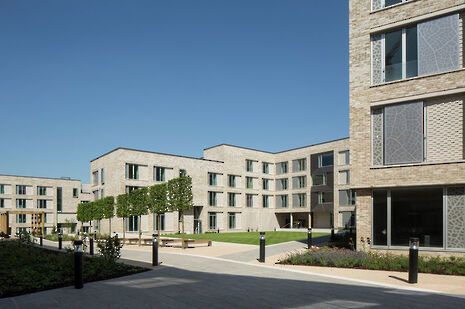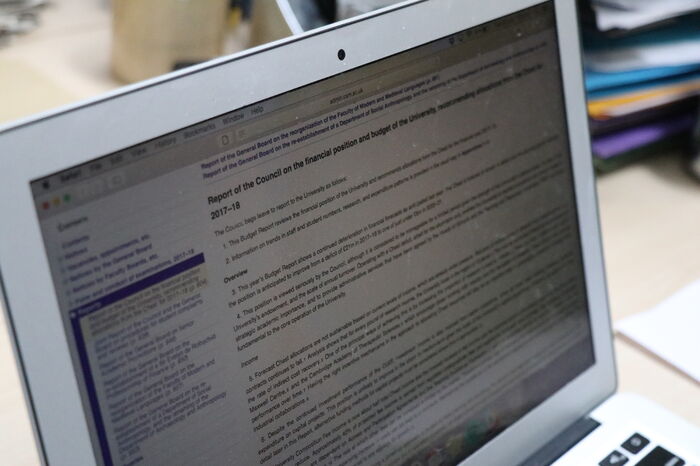University to run £25 million deficit for 2018-19
The annual budget report put the figure down to increased costs for postgraduate scholarships, widening participation initiatives, and lecture capture technology

The University has released its annual budget report, forecasting a deficit of £25.2 million for the year 2018-19, sounding caution over uncertainty caused by the recent dispute over academics’ pensions.
The report, which shows an increase in the deficit from £21 million for 2017-18, recognised that the new deficit is “a deterioration compared to last year’s Budget Report,” citing the “the “major upheaval in political and economic environments [which resulted in] a prolonged period of uncertainty”.
It noted that Brexit has made the University’s financial future more difficult to negotiate, with issues raised regarding “EU student numbers and fees and EU-derived research funding,” as well as making “recruiting and retaining the best staff difficult to predict”.
The report also attributes the increased deficit to a number of factors, including postgraduate scholarships, ‘Widening Participation’ initiatives, and funding for the introduction of lecture capture technology. Other new costs have been associated with the University’s People Strategy, a new project run by the University’s Human Resources Division that is set to improve academic recruitment, pay rewards schemes, and “structured routes for career progression.”
Recent years have seen a series of gloomy forecasts for University finances. In 2015-16, a surplus of £2.7 million was predicted, but the financial year eventually closed on a deficit of £2.1 million. The coming years, however, could bring a small uplift, which the deficit predicted to reduce to £15.0 million by 2021-22, according to the report.
This year’s report said that running a deficit “enabled the University to maintain momentum and invest in areas of strategic academic importance, and provide administrative services that are fundamental to the core operation of the University”, while also acknowledging the need to generate alternative income, and reduce expenditure, in the long-term.
One of the significant expenditures highlighted in the report is the University’s teaching system. It is estimated that “the average annual cost of an undergraduate education borne by the University and Colleges per Home undergraduate student is £18,500”. Cambridge has been commended for its teaching system, earning a gold rating in the newly-introduced Teaching Excellence Framework (TEF), a government scheme to measure the quality of teaching at higher education institutions.
Another large expenditure for the University is its building programmes, which the report forecasts will cost £4 billion over the next 15 to 20 years. The University is currently engaged in a number of capital programmes, including the North West Cambridge development, which is itself expected to cost £1 billion before it is completed, and the new Cavendish Laboratory. The report concedes that “University resources alone cannot deliver development on this scale”.
The Budget Report also highlighted “significant uncertainty” regarding the Universities Superannuation Scheme (USS) pension provision. The recent dispute between Universities UK (UUK) and the University and College Union (UCU), which saw 14 days of strike action in Lent term, was brought to an end with the creation of an expert panel to discuss any future transition to ‘defined contribution’ pension schemes. Future schemes could see an increase from 18% to around 24% in employer contributions, adding to the University’s overall expenditure. The report said that the University “has not budgeted” for these potential increases, but claims that the costs would be “met by the Chest” and there would be a “more sustainable budgetary solution for 2019-20, once the outcomes are known”. In an open meeting last term, Cambridge Vice-Chancellor Stephen Toope said in an open letter that he would “consider whether there is scope for a Cambridge-specific scheme”.
The University’s income depends in large part on the tuition fees it collects from students. For the coming year, its income is predicted to be £471.1 million, slightly higher than was predicted last year, thanks to the increase in forecast overseas students, and an increase in overseas tuition rates.
 Comment / College rivalry should not become college snobbery30 January 2026
Comment / College rivalry should not become college snobbery30 January 2026 News / Downing Bar dodges college takeover31 January 2026
News / Downing Bar dodges college takeover31 January 2026 News / Cambridge for Palestine hosts sit-in at Sidgwick demanding divestment31 January 2026
News / Cambridge for Palestine hosts sit-in at Sidgwick demanding divestment31 January 2026 Science / Meet the Cambridge physicist who advocates for the humanities30 January 2026
Science / Meet the Cambridge physicist who advocates for the humanities30 January 2026 Lifestyle / Which Cambridge eatery are you?1 February 2026
Lifestyle / Which Cambridge eatery are you?1 February 2026










